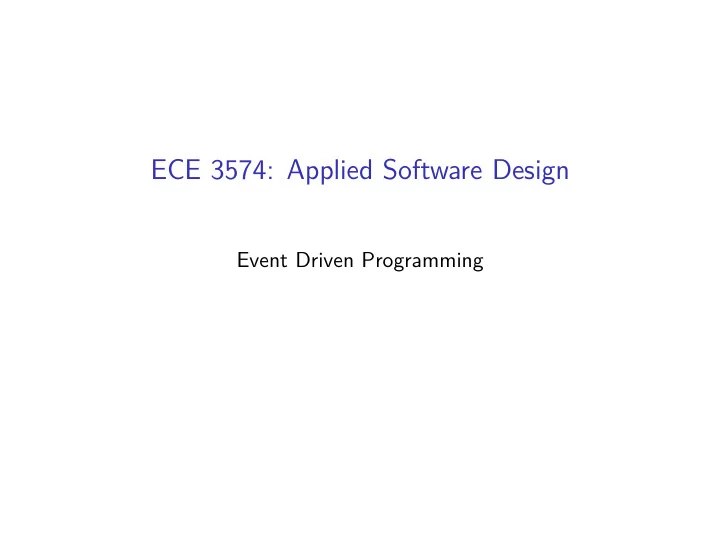

ECE 3574: Applied Software Design Event Driven Programming
Today we will learn how to design systems that respond to internal and external events in an application. ◮ Events and Event Handlers ◮ Events from Windowing System ◮ Timers and other internal events ◮ Observer Pattern ◮ Callbacks versus Polymorphism for implementing event handlers ◮ Qt Event System ◮ Exercise
Events are inputs that are not predictable from the program flow. Examples: ◮ Hardware Event: the user presses a key on a keypad ◮ Software Event: the user clicks on a button in a windowing system The program should be able to respond to these events, i.e handle them, whenever they occur.
Typically events are collected in an event loop using polling Round-Robbin while ( true ){ // check status of switch // handle if changed // ... etc. }
Typically events are collected in an event loop using polling Queuing, or posting the event (like onto a bulletin board) while ( true ){ // check status of switch // post the event, queue it to be handled // ... etc. // handle N events from the queue }
The code that is run in response to an event is a handler . The handler should: ◮ do the minimum amount of work possible ◮ never block execution for extended periods Otherwise the system lags to input or locks up and does not respond to events.
How much work can be done? ◮ Each iteration of the event loop should be limited in time. ◮ How much depends on the application ◮ in a user interface around 250ms ◮ in a control loop, perhaps as little as a 1ms ◮ Add up the total number of events and the time to execute each
How does one do more work in a handler? ◮ concurrency, let the OS handle it (see lectures 18-27) ◮ split work into small chunks, post an event itself ◮ implement a coroutine, a function that can be restarted where it left off (not discussed)
Examples of Events from a Windowing System ◮ show/draw/render the object ◮ focus the object ◮ mouse enter/leave ◮ mouse down, up for left, right, middle, etc ◮ key K press/release ◮ resize object ◮ move object ◮ gestures
Examples of internal events ◮ timers ◮ events posted by other handlers ◮ hardware interrupts
Event systems are an example of the Observer Pattern Observers are objects which observe other objects. Possible implementations: ◮ callback functions ◮ dynamic polymorphism (inheritance) See example code.
Exercise See website
Next Actions and Reminders ◮ Read about Qt Signals and Slots ◮ Milestone 1 is due tomorrow 9/28. Be sure to : ◮ tag your version for grading ◮ push your changes to GitHub before the deadline git tag milestone1 git push origin milestone1
Recommend
More recommend